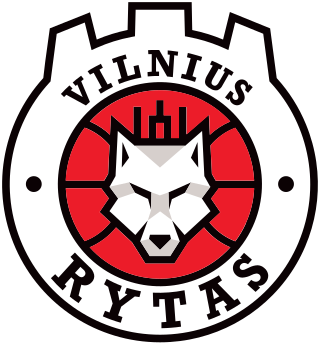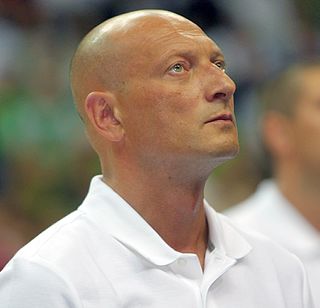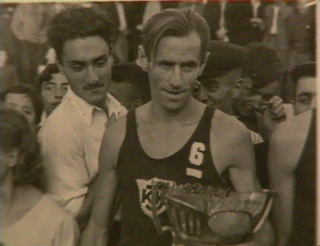
Arvydas Romas Sabonis is a Lithuanian former professional basketball player and businessman. Recognized as one of the best European players of all time and one of the best big man passers in the history of the game, he won the Euroscar six times and the Mr. Europa Award twice. He played in a variety of leagues, including the Spanish ACB League, and spent seven seasons in the National Basketball Association (NBA). Playing the center position, Sabonis won a gold medal at the 1988 Summer Olympics, in South Korea, for the Soviet Union, and later earned bronze medals at the 1992 Olympic Games and 1996 Olympic Games representing Lithuania. He retired from professional basketball in 2005. Sabonis was selected by the Portland Trail Blazers in the first round of the 1986 NBA draft, but he did not play his first NBA game until 1995, at the age of 30.

Basketball Club Žalgiris is a professional basketball team that is based in Kaunas, Lithuania. It competes domestically in the Lietuvos krepšinio lyga. Founded in 1944, it is one of the oldest teams in the EuroLeague. Žalgiris is one of 11 European clubs that holds long-term licenses with the EuroLeague, which provides a guaranteed place in the regular-season phase of the league. Since the 2011–12 season, Žalgiris plays its home games in Žalgiris Arena, which was built just before EuroBasket 2011. The club's name commemorates the victorious Battle of Žalgiris. Both Žalgiris and Grunwald translate to "green wood".

Šarūnas "Šaras" Jasikevičius is a Lithuanian professional basketball coach and former player. He last served as the head coach for FC Barcelona of the Spanish Liga ACB and the EuroLeague. During his playing career, standing at a height of 6 ft 4 in (1.93 m) tall, he played at the point guard position.

Rytas Vilnius is a Lithuanian professional basketball club based in Vilnius, Lithuania. The club was founded in 1997 from another club, Statyba. Rytas have won two EuroCup titles, six Lithuanian League titles, three Lithuanian Cups and three Baltic Championships. The team plays their home games at the 2,741-seat Jeep Arena.

The Lithuania men's national basketball team represents Lithuania in international basketball competitions. They are controlled by the Lithuanian Basketball Federation, the governing body for basketball in Lithuania. Despite Lithuania's small size, with a population of less than 3 million, the country's devotion to basketball has made them a traditional force of the sport in Europe.

The Latvia men's national basketball team represents Latvia in international basketball. They are organized and run by the Latvian Basketball Association. Latvia has reached the European Basketball Championship 15 times, with their ultimate success occurring during the inter-war period, when they became the first team to win the tournament in 1935. Four years later, they had another impressive run to come away with the silver in 1939. Although after 1939, Latvia were forced to suspend their national team operations, due to the Occupation of the Baltic states during World War II. Latvia regained independence in 1991, with their national team taking part in international competition once again a year later.

Saulius Štombergas is a retired Lithuanian professional basketball player, basketball coach and businessman. Štombergas is one of the greatest Lithuanian basketball players of all time, and he was also considered to be a great team leader, as he managed to play very well under pressure, and at the end of games. He was also known for his 3-point shooting ability.

Giedrius Gustas is a former Lithuanian professional basketball player. At the height of 1.90 m tall and a weight of 86 kg, he mainly played at the point guard position. During his club playing career, as a member of Žalgiris Kaunas, he won the EuroLeague championship in 1999. As a member of the Barons LMT, he won the Europe Cup championship in 2008. He was also a member of the senior Lithuanian national team, and with Lithuania, he won the gold medal at the 2003 EuroBasket and the bronze medal at the 2007 EuroBasket.

Modestas Paulauskas is a former Soviet and Lithuanian professional basketball coach and basketball player.

Ramūnas Butautas is a Lithuanian professional basketball coach who last coached Lietkabelis Panevėžys of the Lithuanian Basketball League. He is the son of Stepas Butautas. In 2017, Butautas was elected as the head coach for Lebanon national basketball team.
The Lithuania women's national basketball team represents Lithuania in international women's basketball competitions. They are regulated by the Lithuanian Basketball Federation, the governing body for basketball in Lithuania.

BC Lietkabelis, commonly known as Lietkabelis Panevėžys, also known as 7bet-Lietkabelis for sponsorship reasons, is a Lithuanian professional basketball club based in Panevėžys, Lithuania, participating in the Lithuanian Basketball League and internationally in the EuroCup. The team plays its home games at Kalnapilis Arena, a multi-purpose facility that also doubles as a velodrome. Founded as Lietkabelis in 1964, the team was known by other names between 1996 and 2012. In 2012, after a change in ownership, the team's historic name was restored. It comes from the team's main sponsor, a wire and cable manufacturing company.
Vladas Garastas is a former Lithuanian professional basketball coach and the former president of the Lithuanian Basketball Federation.

Darius Maskoliūnas is a Lithuanian professional basketball coach, former player, and politician.

Alfrēds Krauklis was a former Latvian basketball player and coach, one of the leaders of the Latvian national basketball team in the 1930s, and winner of the silver medal in FIBA EuroBasket 1939. Once he stopped playing, he became a coach and sports event organizer.

Edgaras Ulanovas is a Lithuanian professional basketball player for Žalgiris Kaunas of the Lithuanian Basketball League (LKL) and the EuroLeague. He primarily plays at the small forward position.

Vytautas Kulakauskas was a Lithuanian basketball player, coach, and educator, who competed for the Soviet Union in the EuroBasket 1947 and won a gold medal.
As the participants of the 2006 FIBA World Championship, Lithuanians automatically qualified into the EuroBasket 2007, held in Spain without competing in the FIBA EuroBasket 2007 qualification. New national team coach Ramūnas Butautas debuted. The Lithuanian basketball team of 2007 finished the EuroBasket 2007 with an 8–1 record, winning their first ever bronze medal in EuroBasket tournaments. Winning the third place game in the tournament against Greece allowed Lithuania to qualify for the Olympic basketball tournament at Beijing 2008. Šarūnas Jasikevičius led the tournament in assists by averaging 5.6 assists per game. Lithuania also was one of the best scoring teams in the tournament, averaging 82.0 points per game and were outclassed only by the Spain national team which averaged 82.1 points per game.

Vincas Sercevičius was a Lithuanian basketball player and coach. Together with Stepas Butautas, Vytautas Kulakauskas, Justinas Lagunavičius and Kazys Petkevičius, he was considered as one of the finest Lithuanian basketball players during the first post-war decades. Sercevičius played for the center position and had the outstanding ability to shoot the hook shots with both hands, which earned him the nickname of "The Second Lubinas". However, his international career was impeded by his anti-Soviet political record.
Basketball is the most popular sport in Lithuania. Lithuanian American basketball coaches and players in the 1930s helped the Lithuania men's national basketball team win the last EuroBasket tournaments prior to World War II, in 1937 and 1939, causing a massive impact in Lithuanian society and a basketball popularity spike. Since then, despite Lithuania's small size, with a population of just almost 2.9 million, the country's devotion to basketball has made them a traditional force of the sport in Europe.













